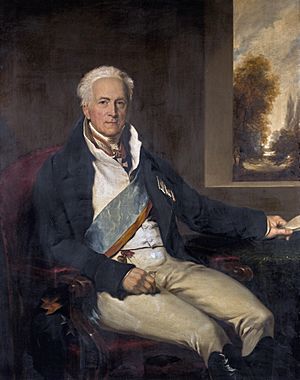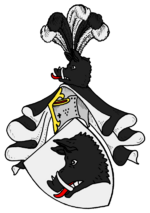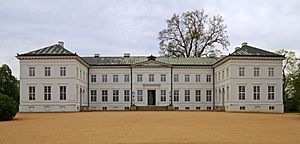Karl August von Hardenberg facts for kids
Quick facts for kids
Karl August von Hardenberg
|
|
|---|---|

Portrait by Sir Thomas Lawrence
|
|
| Prime Minister of Prussia | |
| In office April 14, 1804 – 1806 |
|
| Preceded by | Count Haugwitz |
| Succeeded by | Count Haugwitz |
| In office April – July, 1807 |
|
| Preceded by | Karl von Beyme |
| Succeeded by | Baron Stein |
| In office June 6, 1810 – November 26, 1822 |
|
| Preceded by | Count Dohna-Schlobitten |
| Succeeded by | Otto von Voß |
| 2nd Interior Minister of Prussia | |
| In office 1810–1814 |
|
| Preceded by | Count Dohna-Schlobitten |
| Succeeded by | Count Schuckmann |
| Personal details | |
| Born |
Karl August Fürst von Hardenberg
May 31, 1750 Essenrode Manor, Electorate of Hanover, Holy Roman Empire |
| Died | November 26, 1822 (aged 72) Genoa, Kingdom of Sardinia |
| Spouses |
|
| Children | 2 |
| Parents |
|
| Known for | Being a part of the Prussian Reform Movement |
Karl August Fürst von Hardenberg (born May 31, 1750, died November 26, 1822) was an important Prussian statesman. He served as the Chief Minister of Prussia. Hardenberg helped bring many important changes to Prussia. He worked with Baron vom Stein to improve the army and end serfdom. He also made sure that people from all social classes could work in government jobs. He also helped reform the education system.
Contents
Family Background
Karl August von Hardenberg was the oldest of eight children. His father, Christian Ludwig von Hardenberg, was a high-ranking military officer in Hanover. His mother was Anna Sophia Ehrengart von Bülow. Karl August was born at Essenrode Manor, which belonged to his mother's family. The Hardenberg family has a long history. Their ancestral home is Hardenberg Castle, which they have owned since 1287. The family was given the title of barons and later counts.
Early Life and Career
Hardenberg studied at the universities of Leipzig and Göttingen. In 1770, he started working for the Hanoverian government. He felt his career was moving too slowly, so he traveled a lot. He visited places like Wetzlar, Regensburg, Vienna, Berlin, France, the Dutch Republic, and Great Britain. He even met King George III of Great Britain.
In 1774, he married Countess Christiane von Reventlow. They had two children: a son named Christian Heinrich August and a daughter named Lucie. In 1778, Hardenberg became a count. He later divorced his wife and remarried. He then started working for the Duke of Brunswick. There, he tried to make reforms, but some people did not like his ideas.
Administrator in Southern Germany
In 1791, two areas called Ansbach and Bayreuth became part of Prussia. Hardenberg was chosen to manage these areas in 1792. This was a tricky job because of old land claims. Hardenberg did a great job, making many improvements and helping Prussia gain more influence in southern Germany.
Prussian Diplomat
When the French Revolutionary Wars began, Hardenberg became a Prussian diplomat. He traveled to different courts to get them to support Prussia. In 1795, he helped sign a peace treaty with France in Basel. In 1796, his daughter Lucie married Karl Theodor, Count of Pappenheim.
Joining the Prussian Cabinet
In 1797, King Frederick William III of Prussia called Hardenberg to Berlin. He was given an important role in the government. He became the head of several departments. In 1803, he temporarily took over as foreign minister. This was a difficult time because Napoleon had taken over Hanover. Prussia wanted to stay neutral, but Napoleon's actions made things hard.
On April 14, 1804, Hardenberg officially became the foreign minister. He thought an alliance with France might be best, but other powerful countries disagreed. Napoleon then marched his troops through Prussian land, which angered King Frederick William. On November 3, the King and Tsar Alexander I of Russia agreed to challenge France.
However, before their message reached Napoleon, the Battle of Austerlitz happened. Prussia had to make a deal with Napoleon. By the Treaty of Schönbrunn in 1805, Prussia received Hanover but gave up other lands. Napoleon did not like Hardenberg, so he insisted that Hardenberg be removed from his position. Hardenberg served as foreign minister again for a few months in 1807, but Napoleon again demanded his dismissal as part of the Treaty of Tilsit.
Prussian Chancellor and Reforms
After a period away from power, Hardenberg was called back to Berlin in 1810 to become the Prussian chancellor. The defeat at Jena had changed his views. He now strongly believed in national pride and wanted to restore Prussia's strength. While he was retired in Riga, he had created a detailed plan to rebuild the country.
When he became chancellor, he focused on carrying out major reforms that had been started by Stein.
Key Reforms
- Military System: The army was completely changed and improved.
- End of Serfdom: Serfdom, which tied peasants to the land, was abolished.
- Local Government: Local towns and cities were given more power to govern themselves.
- Civil Service: Government jobs were opened to people from all social classes, not just the nobility.
- Education: A lot of effort was put into improving education for everyone.
These reforms helped Prussia prepare for a fight against France. After Napoleon's failed invasion of Russia in 1812, Hardenberg convinced King Frederick William to declare war on France. He was seen as a hero by many Germans for encouraging national independence. After signing the first Peace of Paris, he was given the title of prince in 1814.
Later Years and Influence
Hardenberg became a key figure among the leaders who governed Europe. He represented Prussia at the Congress of Vienna (1814–1815). However, his influence began to fade. He was not as skilled in diplomacy as Klemens von Metternich, who became more powerful in European politics.
At Vienna, Hardenberg could not get all of Saxony for Prussia. After the Battle of Waterloo and the Second Treaty of Paris, he also failed to break up France further. He allowed Metternich to gain more control over the German states.
Hardenberg continued to work on plans for constitutional reform in Prussia. However, he also wanted to stay in power. When the political mood shifted away from liberal ideas, he went along with it. He died in Genoa in 1822.
In 1814, King Frederick William III gave Hardenberg the area of Quilitz and the title of prince. Hardenberg renamed the place Neuhardenberg (New Hardenberg). He had the manor house and church rebuilt in a neoclassical style. The gardens were also redesigned by his son-in-law, Prince Hermann von Pückler-Muskau, and Peter-Joseph Lenné.
See also
 In Spanish: Karl August von Hardenberg para niños
In Spanish: Karl August von Hardenberg para niños
 | William L. Dawson |
 | W. E. B. Du Bois |
 | Harry Belafonte |



